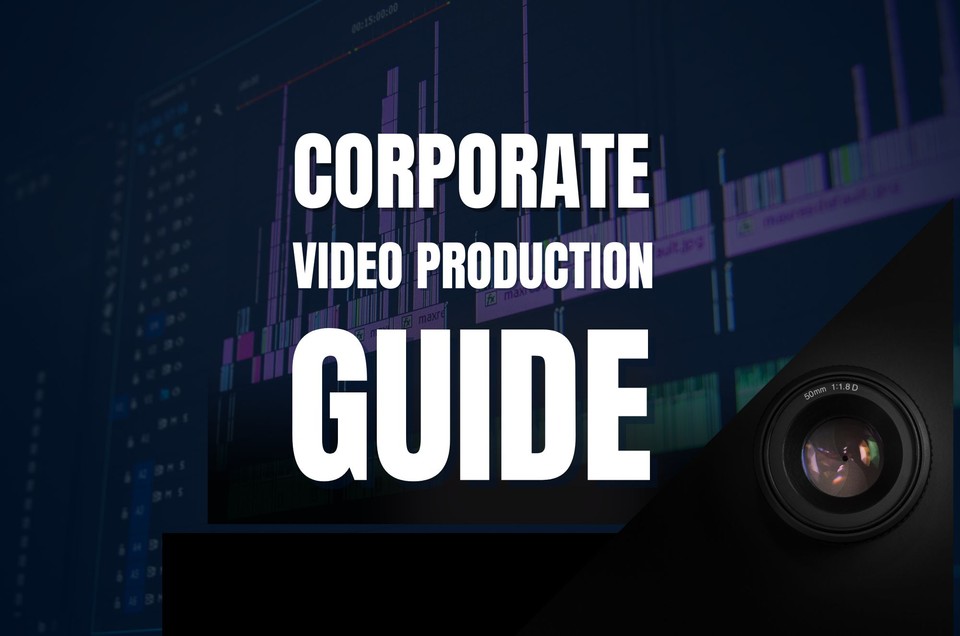Introduction
In today's digital world, people like watching videos made by businesses. Did you know that 91% of people want to see even more video content from companies? It's true! Even 87% of people say that if a video looks good, they trust the company more.
So, why are these numbers important? Well, they show us just how powerful videos can be for businesses. They help tell stories about your brand, show off your products, and let happy customers share their experiences. In this guide, we'll walk you through everything you need to know about making videos for your business.
We'll discuss what makes a good video, how to plan and make one, and the different types of videos you can create. Whether you're already making videos or just starting, this guide will help you make the most of your marketing videos for your business. Let's dive in and learn about the exciting world of corporate video production!

Understanding Corporate Video Production
What is Corporate Video Production?
Corporate video production involves creating videos for businesses to convey specific brand messages to their target audience. These videos serve various purposes, such as promoting products or services, showcasing company culture, or sharing success stories. The primary goal of corporate video production is to capture the audience's attention and effectively communicate the brand's message in a visually engaging manner.
💡 Checkout the essential internal communication tools for 2025!
Why Corporate Videos Matter?
In today's digital landscape, corporate videos have become a powerful medium for corporations to connect with their audience and drive engagement. Here's why they matter:
Engage Audiences: Videos are highly engaging and can captivate viewers' attention more effectively than text or images alone.
Build Trust: High-quality videos help build trust and credibility with your audience, leading to stronger brand loyalty and increased conversions.
Showcase Expertise: Corporate videos allow businesses to showcase their expertise, products, and services in a visually compelling way, helping to differentiate themselves from competitors.
Boost Brand Awareness: Corporate videos can significantly increase brand reach by creating memorable and shareable content.
Types of Corporate Videos
Advertisement Videos: Promotional videos designed to showcase products or services and persuade viewers to take action.
Explainer Videos: Short, animated videos that explain difficult processes in a simple and engaging manner.
Product Demo Videos: Instructional Videos demonstrating how a product works or its key features, helping potential customers better understand its value.
Company Culture Videos: Videos that provide insight into the company's values, workplace culture, and team dynamics, fostering a connection with both employees and customers.
Testimonial Videos: Customer testimonials or success stories that highlight the positive experiences of satisfied customers, building trust and credibility.
Event Videos: Coverage of company events, conferences, or product launches, providing behind-the-scenes glimpses and showcasing brand engagement.
Training and Onboarding Videos: Employee Training videos designed to educate employees or onboard new hires, improving efficiency and consistency in training processes.
Case Study Videos: In-depth analyses of successful projects or collaborations, demonstrating the real-world impact of the company's products or services.
By understanding the various types of corporate videos and their unique purposes, businesses can effectively leverage video content to achieve their marketing objectives and engage their target audience.
The Process of Corporate Video Production
The corporate video production process involves several stages, each crucial for creating high-quality videos that effectively communicate the brand's message. Here's a breakdown of the process:
Pre-production Phase
Concept Development: Brainstorming ideas and defining the overarching concept and message of the video.
Scriptwriting: Crafting a script that outlines the video's storyline, dialogue, and visuals.
Budgeting and Timeline: This involves determining the budget and timeline for the project, including costs for equipment, talent, and post-production.
Production Phase
Filming: In this phase of your corporate video project, your filming team capture footage according to the script, using professional equipment to ensure high-quality visuals and audio.
Interviewing Key Personnel: Your corporate video production team can conduct interviews with key stakeholders, employees, or customers to gather testimonials or insights.
Capturing Company Culture: Next stage involves filming b-roll footage of the workplace environment, team interactions, and events to showcase the company's culture and values.
Post-production Phase
Editing: Piecing together the footage to create a cohesive narrative, adding transitions, effects, and graphics as needed.
Color Correction: Adjusting the colors and tones of the footage to ensure consistency and visual appeal.
Sound and Effects: Enhancing the audio quality and adding music, sound effects, or voiceovers to complement the visuals.
Finalization and Distribution: Review the final video, make any necessary revisions, and prepare it for distribution across various platforms, such as websites, social media, and email.
Each phase of the corporate video production process plays a vital role in bringing the video to life and ensuring its effectiveness in engaging the target audience. By carefully planning and executing each step, corporates can create meaningful videos that resonate with viewers and achieve their marketing goals.
Corporate Video Production Using AI
In recent years, businesses have increasingly turned to AI-powered video creator tools to streamline production processes and maximize efficiency. This shift is driven by the need to optimize resources and reduce costs associated with traditional production methods. With AI, brands can leverage advanced technology to create compelling corporate videos that resonate with their audience without breaking the bank.
One such innovative AI video creator tool is Fliki, a text-to-video platform designed to meet all your content creation needs. Fliki offers various features that make it a go-to solution for businesses looking to produce high-quality corporate videos effortlessly. From YouTube to TikTok, Instagram, Facebook, and beyond, Fliki enables users to generate creative videos easily.
How to Produce Corporate Videos with Fliki AI

Log in or sign up on Fliki.
Click +New File option and write the file name.
Select the language, dialect and aspect ratio.
Choose from input options such as script, idea, blog, PPT, tweet, or product.
Submit your input, and watch as Fliki's powerful AI transforms your ideas into captivating videos.
Leveraging Fliki's Templates for Effortless Video Creation
Fliki's latest update introduces a range of templates that simplify the video creation process even further. These templates feature preset design animations and layouts, allowing businesses to create professional-quality on-brand videos with minimal effort. Fliki's templates provide the flexibility and customization options you need to produce engaging corporate videos quickly.
Conclusion
Making videos for businesses is a great way to connect with people online. Corporate videos help companies tell their stories, show off their products, and let happy customers share their experiences. Understanding how to make good videos and the different types you can create is important for any business.
Even AI technology, like Fliki, can make video production easier and cheaper for businesses. With Fliki, you can turn your ideas into videos quickly and easily without needing many technical skills.
In conclusion, videos are a powerful way for corporations to reach their audience and share their message. Using tools like Fliki, companies can create professional-looking videos that help them stand out online.
FAQs
Corporate video production is creating videos for businesses with the target of conveying specific messages to their target audience. These videos serve various purposes, such as promoting products or services, showcasing company culture, or sharing success stories.
To make a corporate video, you'll need to follow a few key steps. First, plan your video by brainstorming ideas, crafting a script, and setting a budget. Then, film your video using professional equipment and techniques, including capturing interviews and b-roll footage. Finally, edit your footage to create a cohesive narrative, adjust colors and sound, and finalize your video for distribution.
Corporate videos are made specifically for businesses and serve internal or external communication purposes, such as promoting products, showcasing company culture, or providing training. Commercial videos, on the other hand, are typically created for advertising purposes and are aimed at promoting a product or service.



